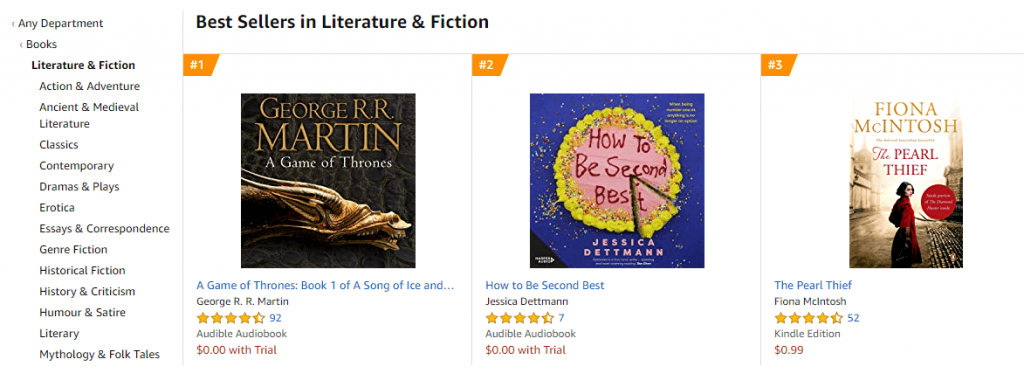How to create good titles for Books? Get more readers on Wattpad!
Creating good titles for books is essential for getting readers!
Your book title will be the first thing that your future readers will have in front of their eyes. By reading your book title, this person will make a prediction about the content of your book, as well as get a sense of it. This combo will make your future reader want to know more about your story, or simply not be interested in it.
Find the most important elements of your story
The answer is inside your book!
As an author, you’re the right person to find the strongest elements of your story. Before starting to write good titles for your book, it’s best to write certain key aspects of your book on a piece of paper. This paper will stay by your side when you go to write titles.
Dedicate some time to questions like:
- What are the main themes of your book?
- List the chapters and sentences that you’re most proud of.
- What do you think is the most important part?
Knowing these aspects will help you write good book titles without putting aside the most emblematic elements of your book.

Know your genre and use its secret formula
Look for books in your genre and learn from them!
What do they have in common? Do they use long or short titles? Do they use specific verbs? Research and figure out all the features or patterns that will help you create original ideas that also work.
We don’t recommend going too far outside the box. Why? Because big publishing houses already know what sells well. It’s a good idea to research best selling books on Amazon, filter for your category and read as many titles as you can. In addition, don’t forget to check out titles of the most famous books in your genre.

Ideas to help your book title creativity
- Use action words: Examples: Game of Thrones, Gone With the Wind
- Create intrigue or mystery: The Meadow of the Butterflies, The House of Spirits, The Lord of the Flies
- Include the name of the main character: The Great Gatsby, The Picture of Dorian Gray, Lolita
- Include key places: Treasure Island, The Tunnel, The Magic Mountain
- Puzzling titles: To Kill a Mockingbird, The Name of the Rose, Clockwork Orange
- Short titles: The Hive, 1984, The Odyssey, The Road
- To reflect: The Labyrinth of Solitude, Brave New World, The Unbearable Lightness of Being
- Everyday titles: Five Hours With Mario, In Cold Blood, The Old Man and the Sea
- To tell a story: The War at the End of the World, The Monk Who Sold His FerrariColorful titles: The Crimson Rivers, My Name is Red
Use the Title Creator and find new ideas
A tool that can help your book title creativity is this random title generator. This doesn’t mean that your title will be created by magic – it’s just to help. With this tool, you can add a genre (adventure, fantasy, etc.) and a few words that have to do with your book.
Every time you click on “Get Names,” it will give you a list of possible names for your book. Some won’t make sense, but others could help you think of ideas that you didn’t have in mind.
Just like before, write down all the ideas that you think will be helpful for creating good titles.

Try brainstorming good titles
Brainstorming is best done in a group, but it could also help you find good book titles on your own.
On a piece of paper, write words related to the strongest ideas or parts of your book. Let one word lead you to another, go with them and write them down. Once you think you have enough, group them by category and use this paper later when you go to write your title.

It’s time to create a master list of Titles!
Start creating a list of as many good book titles as possible. Experiment with them, cross them out, create new ones, change adjectives, look up synonyms and above all, make your title exciting and easy to read.
For each one of them, try to keep in mind these steps:
- The title should show the essence of the book and fit the genre.
- Give enough information to raise questions that attract the reader to your story
- Careful with length. In most cases, short but striking titles are more successful than titles that are long and difficult to remember. Don’t use capital letters for short prepositions such as “and, to, a/an, the.” Only capitalize if it’s the first word of the title.
- Use strong language, so your title stands out.
- Make your title fit your story. This is one of the most important rules, to be honest.
- Keep an online thesaurus open. You can improve titles that you like due to the concept, but that you think could be better.
Don’t settle for only a few titles! Try to create a list of minimum 20 good titles.
Toss out some and stick with the best titles
Read your list of titles as many times as necessary, compare it with others, choose the best of the group and so on. Ask questions such as:
- Which titles are your favorites?
- Which follow the rules of your genre?
- Which is easiest to remember?
- Which hooks the reader?
If you’re tired, take the day off and come back to your list of good titles for books the next day. Your mind will be recharged and you’ll see your list with new eyes after a good rest.
Choose the 5 best titles from your list. Don’t throw away your full list! You may need it again.
Survey your friends and family about titles
Ask your family members and friends (the more, the better) which titles they like best and why. Don’t be shy. Ask them to choose only one and write down their opinions. This will help you see your list of good titles for books with a new perspective and identify strengths and weaknesses for each title.

Easily create a cover for your book title
Consider the information you’ve collected, make your final choice and start creating a cover for your book. Once created, add your amazing title and win over your readers!
Don’t forget, if you liked this article, share it!






